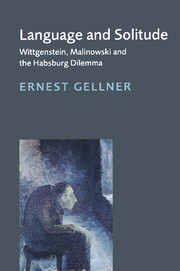Book contents
- Frontmatter
- Contents
- Preface
- Foreword
- Part I The Habsburg dilemma
- 1 Swing alone or swing together
- 2 The rivals
- 3 Genesis of the individualist vision
- 4 The metaphysics of romanticism
- 5 Romanticism and the basis of nationalism
- 6 Individualism and holism in society
- 7 Crisis in Kakania
- 8 Pariah liberalism
- 9 Recapitulation
- Part II Wittgenstein
- Part III Malinowski
- Part IV Influences
- Part V Conclusions
- General bibliography
- Bibliographies of Ernest Gellner's writings on Wittgenstein, Malinowski, and nationalism
- Index
8 - Pariah liberalism
Published online by Cambridge University Press: 05 March 2010
- Frontmatter
- Contents
- Preface
- Foreword
- Part I The Habsburg dilemma
- 1 Swing alone or swing together
- 2 The rivals
- 3 Genesis of the individualist vision
- 4 The metaphysics of romanticism
- 5 Romanticism and the basis of nationalism
- 6 Individualism and holism in society
- 7 Crisis in Kakania
- 8 Pariah liberalism
- 9 Recapitulation
- Part II Wittgenstein
- Part III Malinowski
- Part IV Influences
- Part V Conclusions
- General bibliography
- Bibliographies of Ernest Gellner's writings on Wittgenstein, Malinowski, and nationalism
- Index
Summary
As described above, the new men who had risen by their own efforts were naturally drawn to liberalism, especially as their own social acceptance and recognition was partial, vacillating and ambivalent. They had good cause to fear both the exclusiveness and the communalistic leanings of the new nationalisms. They had every reason to wish the Empire, precluded by its ethnic pluralism from becoming ethno-chauvinistic, to remain in existence and to move in the direction of an open, non-ethnic state and society of individuals. So the philosophy to which they were naturally drawn was an individualistic-liberal one, which saw the acquisition of knowledge, the production of wealth, the creation of beauty, as primarily individual achievements. They valued their own assimilation into the dominant linguistic culture, their detachment from their erstwhile roots, especially when these had constituted a stigma. Their penchant for individualism may have been strengthened by the constant inflow into Vienna of new migrants from the provinces, provocative by their non-assimilation (as yet), and reminding their predecessors in the move to the centre of the fact that they hadn't been there all that long and that their acceptance was not wholehearted or beyond challenge. The new migrants not only were not yet assimilated, they had a stronger sense of the kin collectivity and did not exemplify real individualism, thereby aggravating the offence of their existence. The Open Society was to be seen in the successful professional bourgeoisie, the Closed Society in the new migrants, with their ethnic politics and a personal style which put the achievements of the earlier comers in jeopardy.
- Type
- Chapter
- Information
- Language and SolitudeWittgenstein, Malinowski and the Habsburg Dilemma, pp. 35 - 36Publisher: Cambridge University PressPrint publication year: 1998



